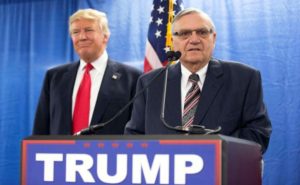Donald Trump promised to be “the law-and-order president,” which harkened back to the call issued in the late 1960s by Richard Nixon’s campaign for the presidency.
The way I see it, though, Trump’s pardon of former Sheriff Joe Arpaio douses the president’s law-and-order pledge bigly.
Arpaio once served as sheriff of Maricopa County, Ariz. He made a big name for himself by his tough policies on illegal immigration. He would racially profile individuals he assumed were entering the country illegally; he would detain them, often in brutal conditions.
A federal judge ordered Arpaio to cease that round-up policy. He refused. The judge put him on trial. The sheriff was convicted. Oh, and then he lost his re-election bid along the way.
How does this comport with the president’s pledge to be the law-and-order guy? It doesn’t.
The president stuck his thumb in the eye of the federal judicial system. He, in effect, said the rule of law doesn’t apply. The pardon clearly is within the president’s realm of power. Some arguing that the pardon might be illegal; I won’t go there.
A pardon’s legality doesn’t necessarily make it right. In this case, it pulls precisely against the pledge the president made to emphasize law and order.
By flouting the rule of law, therefore, the president has declared war as well on any semblance of order.
